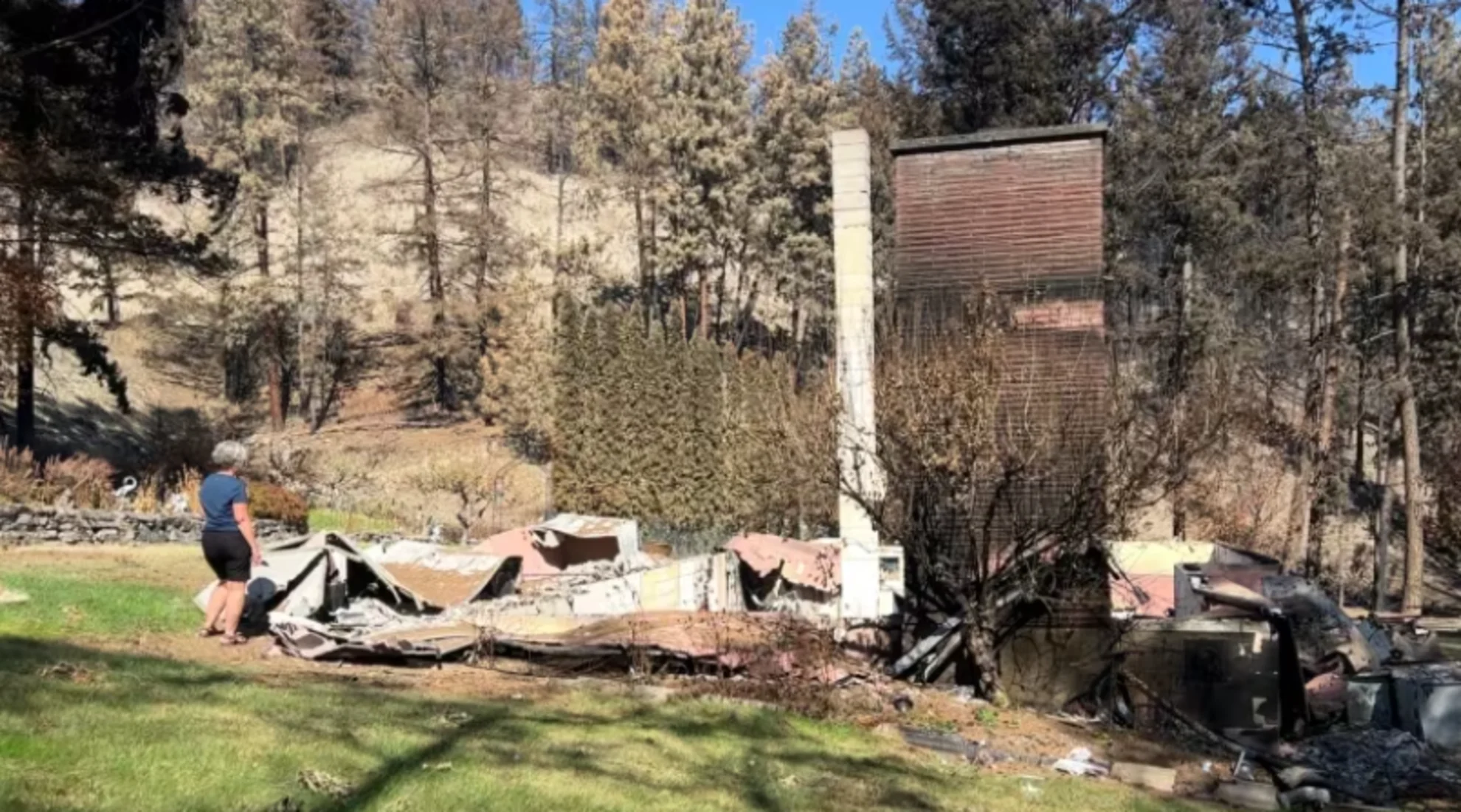
Evacuees return to areas near West Kelowna destroyed by McDougall Creek wildfire
Visit The Weather Network's wildfire hub to keep up with the latest on the unprecedented wildfire season across Canada.
When Claire Larose left her home four weeks ago, she never imagined she'd return to find it burned down to its cement foundations.
"It's just devastating to our hearts and our souls.... It's just devastating to see there's nothing left," Clair said.
Larose has lived in the rural neighbourhood on the west side of Okanagan Lake just north of West Kelowna, B.C., for the past 36 years along with her husband, Gerry. They enjoyed the tranquillity of the area and the many walking trails though the forests which dot the slopes rising from the lake.
But now coming back with their dog Diva, the Laroses find the trees surrounding their property are charred — many of them resembling large, blackened poles sticking out of the ground.
"We knew it would be devastating but once you see it, it's pretty hard to believe.... All this area is places we hiked,' said Gerry.
SEE ALSO: Evacuation orders issued, expanded as B.C.'s wildfire threat refuses to subside
"It's a place we loved. All the neighbours here, they loved this area. And that's the part that's really tough. You have to let go of an area you loved for so long," added Claire.
The Laroses were among the more than 10,000 people who fled the McDougall Creek wildfire in mid-August.
Fanned by strong and gusty winds the fire would go on to damage or destroy 189 properties in the central Okanagan, the vast majority of them in the West Kelowna area.
Fire fighting is expected to continue into the fall before the fire is fully extinguished, according to officials.
Over the past two weeks emergency officials have been allowing evacuees back into their homes or to see whether their properties were severally damaged or destroyed.

Claire and Gerry Larose's home is one of nearly 200 structures damaged or destroyed by the McDougall Creek fire in the Central Okanagan. (Brady Strachan/CBC)
Late last week officials opened up access to neighbourhoods in the Bear Creek Road area where the Laroses live, leaving only 77 properties still under an evacuation order.
The couple say despite the overwhelming devastation, the emergency has brought neighbours closer as many of them face the same daunting task of rebuilding.
"People kind of had to band together to force the hand [of officials] to get some answers," Claire said.
"I think everyone is going go be helping each other out in the rebuild in how we all move forward from here."
Further down the road Jeff Findlay is bringing his animals back to what is left of his family's trail riding business, the Broken Rail Ranch.
The fire destroyed his home, his barn, other outbuildings and fencing.

A work crew starts to replace burned fencing on the Broken Rail Ranch near West Kelowna, B.C. (Brady Strachan/CBC)
A group of friends are helping with the first steps of recovery for the ranch — clearing away ash and debris and rebuilding fencing.
"There are a lot of emotions going on." said Findlay as he looked out at the burned structures on his farm.
"Everything is burned and destroyed around us but we immediately started putting up temporary fences with the idea of getting our horses back today and that's what we are doing today."
One bright spot for Findlay and his family is the remarkable survival of their 140-kilogram potbelly pig, Pumba — one of Findlay's two pigs that refused to be loaded in a horse trailer as the fire encroached.

Jeff Findlay was able to load his 20 horses onto trailers as the fire encroached in August, but his potbelly pig Pumba refused to be loaded and stayed behind. Four weeks later Findlay was able to finally return to the ranch where Pumba had survived. (Brady Strachan/CBC)
"You leave them behind and hope that they chose the right place to survive and Pumba chose the field."
Findlay's second pig did not survive the fire, but days after the blaze tore through the property Findlay says he got word Pumba was alive and being fed and watered by firefighters.
A friend who owns a helicopter company dropped food down to Pumba while the area was still deep behind evacuation lines.
"She's been well fed. She's probably put on 50 pounds and very healthy," Findlay said.
"She got a bit of burns on one side of her ... and her skin peeled off, but she's healthy now. I think her biggest issue was being lonely and now being overweight."
Findlay is now in the process of dealing with insurance companies to fully assess the damage an work toward rebuilding.
However with scorched forests surrounding the network of trails he uses for guests, Findlay worries about the future of his business.
"I have no income which unfortunately means I have to sell my second family, which is my horses which we're really close to," Findlay said.
Like many here, Findlay plans to rebuild but he worries the road to recovery here will be a long one.
Thumbnail courtesy of Brady Strachan/CBC.
The story was originally published for CBC News.










